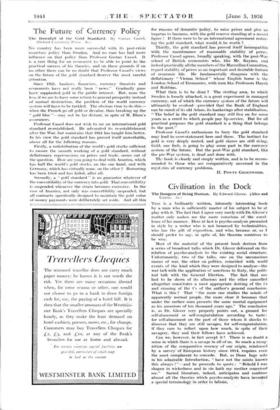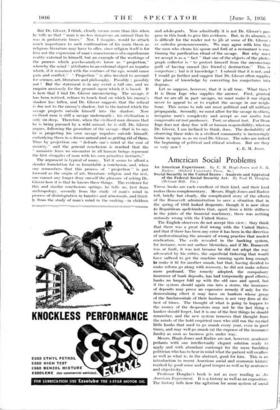Civilisation in the Dock
Tins is a brilliantly . -written, intensely interesting . book by a man who is sufficiently master of his subject to be at play with it. The fact that I agree very rarely with Dr. Glover's matter only makes me the more conscious of- •-the excel- lence °this manner._ Here atlast.is psycho-analysis presented in style by a writer who is not..benitised by technicalities,. who has the gift of exposition, and who, beeattse or, as I should prefer to say, in spite of, .his--theories -contrives to
be wise. .
Most of the material of the present. book derives -from a series of broadcast talks which Dr. Glover- delivered on the relation of psycho-analysis to the existing social -structure. Unfortunately, two of the talks, one on the unconscious causes of war, the other on politics, coincided with world events of the kind which they were designed to analyse—the war talk with the application of sanctions to Italy, the polit- ical talk with the General Election. The -fact that one had to be shorn of its allusions 'and the other cancelled altogether constitutes a most appropriate dotting of the i's and crossing of the t's of the author's general- conclusion. What is this ? That the more one studies the minds of apparently normal people, the more clear it becomes that under the surface man presents the same mental equipment as his ancestors of ten thousand years ago." The conclusion is, as Dr. Glover very properly points out, a ground for self-abasement or self-congratulation according to taste: for self-abasement on the part of those whom it shocks to discover that they are still savages, for self-congratulation, if they care to reflect upon how much, in spite of their savagery, they and their fellows have achieved. Can we, • however, in fact 'accept it? There is no doubt a sense in which there is a savage in all of us. So much a recog- nition of the comparative recency of our origin, reinforced by a survey' Of European history since 1914, -requires even the most complacent to- concede. But, as Dean Inge asks in his admirable Introduction, "have not the saints known this always ?'—and he proceeds to quote : "Behold I was shapen in wickedness and in sin. hath my mother conceived me." Sacred literature, indeed, anticipates and confirms almost all the theories which psycho-analysts have invented a special terminology in" ordc.1 to labour; But Dr. Glover, I think, clearly means more than this when he tells us that " man is no less dangerous an animal than he was in prehistoric times." Nor, I imagine, would he attach much importance to such confirmation of his main thesis as religious literature may have to offer, since religion itself is for him not the expression of man's consciousness of a superhuman reality external to himself, but an example of the workings of the process which psycho-analysts know as "projection," whereby the mind " attributes to an external object an impulse which, if it remained with the confine.: of the ego, would cause pain and conflict." " Projection " is also invoked to account fir science, art, literature and philosophy. Possibly ; possibly .not ! But the statement is in any event a tall one, and we enquire anxiously for the grounds upon which it is based. It is here that I find Dr. Glover unconvincing. The savage, it has been noticed, refuses to touch food on which his enemy's shadow has fallen, and Dr. Glover suggests that the refusal is due not to the enemy's shadow, but to the hatred which the savage projects outside himself into the shadow. Now civilised man is still a savage underneath ; his civilisation is only sin deep. Therefore, when the civilised man dreams that he is being pursued by a wild animal, he is still, Dr. Glover argues, following the procedure of the savage—that is to say, he is projecting his 'own savage impulses outside himself, embodying them in a dream animal and so getting rid of them. Thus by projection one "defends one's mind at the cost of anxiety," and the general conclusion is reached that the " animistic fears we encounter in all human beings represent the first struggles of man with his own primitive instincts."
The argument is typical of many. Yet it seems to afford a slender foundation for so formidable a conclusion, and, when one remembers that this process of " projection " is put forward as the origin of art, literature, religion and the rest, one cannot any longer deny oneself the pleasure of asking Dr. Glover how it is that he knows these things. The evidence for this and similar conclusions springs, he tells us, first from anthropology. secondly from the study of man's mind in process of disintegration in lunatics and abnormals, and third- ly from the study of man's mind in the making—in children and adoleFzents. Now admittedly it is not Dr. Glover's pun- : pose in this book to_ give this evidence. But, in its absence, it is difficult for the reader not to jib at some of Dr. Glover's ex cathedra pronouncements. We may agree with him that the man who cleans his spoon and fork at a restaurant is con- tinuing the purification ritual of the savage. But why must we accept is as a " fact " that one of the objects of the photo- graph collector is "to protect himself from the unconscious guilt of having caused [his friend's] destruction." This is conjecture ; but is it knowledge ? I submit that it is not, and I would go further and suggest that Dr. Glover often supplies the place of knowledge by converting his conjectures into dognias.
Let us suppose, however, that it is all true. What then ? It is Dean Inge who supplies the answer. First, granted that we are all in part savages, we must make it our object never to appeal to or to exploit the savage in our neigh- bour. This seems to rule out most political and all military propaganda. Secondly, we must allow for the savage in others, recognise men's complexity and accept as our motto tout comprendre eel lout pardonner. Tout, or almost tout. For Dean Inge does not deny free will or human responsibility, whereas Dr. Glover, I am inclined to think, does. The desirability of observing these rules in a civilised community is increasingly borne in upon us as we read Dr. Glover. The rules are indeed the beginning of political and ethical wisdom. But are they















































 Previous page
Previous page